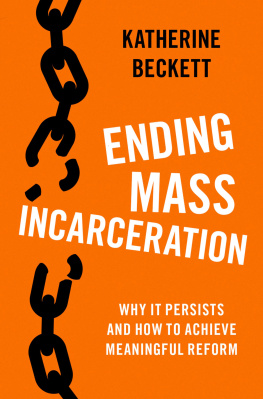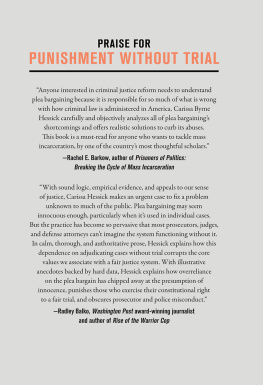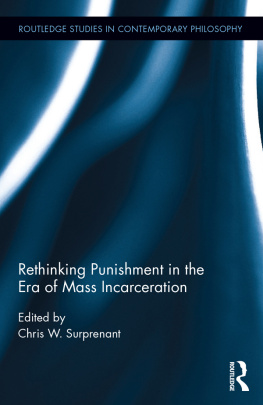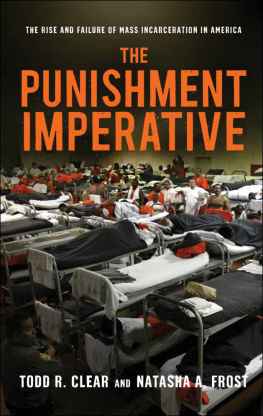PERVASIVE PUNISHMENT
PERVASIVE PUNISHMENT
Making Sense of Mass Supervision
BY
FERGUS McNEILL
University of Glasgow, UK
Emerald Publishing Limited
Howard House, Wagon Lane, Bingley BD16 1WA, UK
First edition 2019
Copyright 2019 Fergus McNeill
Published under an exclusive licence
Cover image: Gabi Frden
Cover Layout and Typography: Mike Hill
Reprints and permissions service
Contact:
No part of this book may be reproduced, stored in a retrieval system, transmitted in any form or by any means electronic, mechanical, photocopying, recording or otherwise without either the prior written permission of the publisher or a licence permitting restricted copying issued in the UK by The Copyright Licensing Agency and in the USA by The Copyright Clearance Center. Any opinions expressed in the chapters are those of the authors. Whilst Emerald makes every effort to ensure the quality and accuracy of its content, Emerald makes no representation implied or otherwise, as to the chapters suitability and application and disclaims any warranties, express or implied, to their use.
British Library Cataloguing in Publication Data
A catalogue record for this book is available from the British Library
ISBN: 978-1-78756-466-4 (Print)
ISBN: 978-1-78756-465-7 (Online)
ISBN: 978-1-78756-467-1 (Epub)
For Gordon and all the Paulines.
CONTENTS
LIST OF FIGURES
LIST OF TABLES
ABOUT THE AUTHOR
Fergus McNeill is Professor of Criminology and Social Work at the University of Glasgow where he works in the Scottish Centre for Crime and Justice Research and in Sociology. Prior to becoming an academic in 1998, he worked for 10 years in residential drug rehabilitation and as a criminal justice social worker.
His many research projects and publications have examined institutions, cultures and practices of punishment and rehabilitation particularly in the community and questions about their reform. Between 2012 and 2016, he chaired an EU-funded research network on Offender Supervision in Europe which involved about 70 researchers from across 23 jurisdictions. This book reflects upon and consolidates learning from that network.
Fergus has co-written or co-edited several previous books including Offender Supervision: New Directions in Theory, Research and Practice, Offender Supervision in Europe, Reducing Reoffending: Social Work and Community Justice in Scotland, Understanding Penal Practice and Youth Offending and Youth Justice. His most recent books include Community Punishment: European Perspectives (co-edited with Gwen Robinson); Probation: 12 essential questions (co-edited with Ioan Durnescu and Rene Butter); Beyond the Risk Paradigm in Criminal Justice (co-edited with Chris Trotter and Gill McIvor); and Reimagining Rehabilitation: Beyond the Individual (co-written with Lol Burke and Steve Collett and published by Routledge in 2018). Pervasive Punishment is his first sole-authored monograph.
Currently, Fergus is leading Distant Voices: Coming Home, a major 3-year Economic and Social Research Council/Arts and Humanities Research Council project using creative practices to explore crime, punishment and reintegration. The project is a partnership between Vox Liminis (a third sector organization that Fergus helped establish), the University of Edinburgh, the University of Glasgow and the University of the West of Scotland.
ACKNOWLEDGEMENTS
This book has been a long time in the making, and I owe too many debts to acknowledge them all here but Im going to name a few.
Pervasive Punishment might never have been written but for the generosity of the British Academy in awarding me a Mid-Career Fellowship (Award No. MD160022). Im especially grateful to David Garland for his support for my application. During session 20172018, the British Academy award paid for the wonderful Caitlin Gormley to cover much of my teaching (so well that I fear that colleagues and students wont want me back!).
The Fellowship also allowed me to travel to meet with some remarkable and generous scholars and friends so that I could road-test some of the ideas in this book. I had the great pleasure of visiting Reuben Miller (University of Chicago), Josh Page and Michelle Phelps (University of Minnesota), Jon Jacobs (John Jay College, City University of New York), Kristel Beyens (Free University of Brussels) and Miranda Boone (University of Leiden). I am also very grateful to colleagues and students who took time to attend seminars, offered insightful comments and showed me wonderful hospitality. As well as my official hosts, particular thanks are due to Jess Bird, Jay Borchert, David Green, Lila Kazemian and Jennifer Peirce.
British Academy Mid-Career Fellowships also provide some funds for public engagement. I used these resources to establish the Pervasive Punishment blog (www.pervasivepunishment.com) and to support book-related events organized by the Howard League Scotland in Edinburgh and the Howard League for Penal Reform in Oxford. Im very grateful to both organisations for these opportunities to share the work in progress. These events also included performances of songs related to punishment, reintegration and supervision written in workshops organized and run by Vox Liminis, a Scottish charity that brings creative practice to criminal justice and its reform (www.voxliminis.co.uk). Louis Abbott (in Edinburgh) and Donna Maciocia (in Oxford) provided these beautiful performances. It is a pleasure and a privilege to work with Louis and Donna and everyone else associated with Vox. I owe you all and especially Alison Urie (that other Wayward Puritan) a very great deal for teaching me so much about so many things; not least the importance and potency of creativity.
On the subject of creativity, I also want to thank Martin Cathcart Froden and Phil Thomas for some early advice in relation to the short story that is woven through this books chapters, to Gabi Frden for the cover art, and to Jo Collinson Scott for agreeing to write an EP of songs inspired by the story and the book. We say more about this process and about the relationships between the research, the story and the songs in the books post-script. The cover art and EP were also funded by the British Academy Fellowship. It is a genuine delight to have been able to assemble all these different ways of seeing, hearing and sensing supervision with help from so many talented friends.
All but one of the photographs that illustrate this book were taken by supervisees and supervisors in the Supervisible and Picturing Probation projects (discussed in chapter 5). These projects were part of the COST Action IS1106 on Offender Supervision in Europe which I chaired between 2012 and 2016. Wendy Fitzgibbon inspired and led the Supervisible project, and Picturing Probation was led by Nicola Carr, Gwen Robinson and Anne Worrall. I am grateful for their permission to use some of these projects photographs in the book, but my debt extends to all 70-odd active members of the Action. This book is, in large part, an attempt to consolidate what I learned from and with all of them. I want to pay special tribute to the Actions core leadership group Miranda Boone, Niamh Maguire, Martine Herzog-Evans, Christine Morgenstern, Elena Larrauri, Ioan Durnescu, Christian Grafl, Gwen Robinson, Kerstin Svensson, Martin Lulei, Ineke Pruin and Sandra Scicluna and to pay special tribute to Kristel Beyens who, as Vice-Chair, offered me invaluable and unfailing support for those four years.








